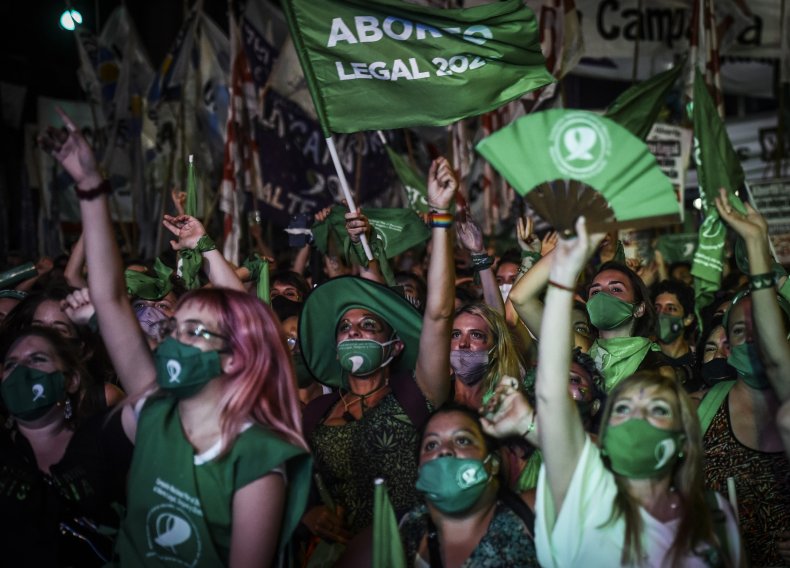Dr. Miranda Ruiz, from Argentina's Salta province, is accused of performing an abortion without the patient's consent.
Ruiz has denied the claims. She was jailed for several hours in August and faces a decade in prison if convicted.
"At one point, I felt that if I had been in the Middle Ages, I would have been burned," Ruiz told the Associated Press.
Argentina's Voluntary Interruption of Pregnancy Law, implemented December 30, 2020, allows abortions up to the 14th week of gestation, with exceptions for cases of rape or if continuing the pregnancy poses too much of a health risk.
While abortions are easier to get in places like Buenos Aires, in Ruiz's town of Tartagal, 745 miles from the capital, she is one of very few providers. Ruiz said she covers over 90 percent of abortions in her area.
Prosecutor Gonzalo Vega said the accusations against Ruiz come from the uncle of the patient, who was in her 22nd week of pregnancy. The uncle said his niece tried to stop the abortion but would not be let out of the hospital.
Ruiz denied this, saying that she, a psychologist and a social worker evaluated the patient beforehand. She added that the abortion "was endorsed by the (hospital) management, the head of the gynecology service and the supervisor of sexual and reproductive health of Salta. That's all written in the medical record."

Every week of late, more than 20 women with unwanted pregnancies come to Ruiz, one of the few physicians who perform free abortions in northern Argentina's Salta province—many under a year-old law that legalized elective abortion to the 14th week of gestation.
Yet activists say that abortion services in socially conservative parts of the country such as Salta remain restricted and under threat, leaving poor women the choice of a clandestine abortion or having an unwanted child.
Elective abortion also is legal in the Latin American nations of Cuba, Guyana, French Guiana, Uruguay and parts of Mexico. Some countries, such as Chile, allow abortions due to rape, when a fetus is malformed or for danger to a woman's life. Total bans are in place in Nicaragua, Honduras, El Salvador and the Dominican Republic.
Since the beginning of the year, 32,758 pregnancies have been terminated at the 1,243 medical centers across Argentina willing to perform abortions, according to Ministry of Health figures.
But ease of access often depends on the cooperation of local officials.
Women also often face bureaucratic obstacles to abortion and lack information about how to apply for one, activists say.
"There are spaces where abortion is guaranteed," but in others women have little support, said Ruth Zurbriggen, a member of the Network of Rescuers, an activist group that even before the law passed helped women seeking abortions.
Valeria Isla, national director for sexual and reproductive health at the Ministry of Health, agreed the law is not being applied evenly, but said there have been advances since it was adopted. She said challenges include expanding the number of public health centers and doctors performing the procedure.
Salta is one of the places where few professionals are available to perform the procedure, according to doctors consulted by the Associated Press, and Ruiz said the case against her could aggravate that.
She has a small office at the Juan Domingo Perón public hospital in Tartagal, a town of mostly low-income people. She said patients, who also come from neighboring provinces, seek her out because word has spread that she will perform abortions.
Ruiz speculated that the accusations against her were intended to dissuade other physicians from performing abortions, but she said the effect was the opposite.
"As it gained public notice, not only did the number of patients who come to see me expand, information is circulating," she said.
Vega denied seeking to "silence" health professionals. He also alleged "that the express consent required for performing the termination of the pregnancy" was not signed by Ruiz until after the abortion. Ruiz denies that.
The identity of the complainant has not been made public.
In the neighboring Santiago del Estero province, only two hospitals perform abortions and women there can't seek the procedure directly: They must call a confidential telephone line at the national Ministry of Health to start a process of being put in touch with doctors who do abortions.
"Along with the bureaucracy, there is the stigma, the abuse, making them wait," said Dr. Teresa Santillán, who performs abortions in a private practice and works in a primary public care unit in Santiago del Estero.
"Women have ultrasounds in the same place where they are pregnant for prenatal care, and in the (waiting) corridor they ask, 'Who has come for abortion?'" Santillán said. "There is no closed place that preserves confidentiality."
The Associated Press contributed to this report.


Post a Comment